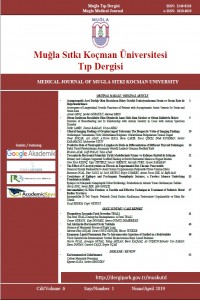Abstract
Transfusion related
acute lung injury (TRALI) is characterized by acute hypoxemia and non-cardiac
edema which occurs during the transfusion or within the first 6 hours. Hypoxia,
dyspnea, cyanosis, fever and tachycardia are caused by non-cardiac pulmonary
edema. Transfusion-related deaths are the most common cause after hemolysis It
is known that TRALI is mostly seen with plasma and platelet replacements. The
risk of development of TRALI rises with the increasing number of transfusions.
The use of blood and blood components for plasmapheresis and similar processes
alongside the routine indications has become increasingly widespread. Therefore
clinicians are more likely to meet the complications related with transfusion.
In this study, we purposed to present an acute lung injury case caused by fresh
frozen plasma during plasmapheresis in the context of the literature.
Keywords
Fresh Frozen Plasma Plasmapheresis Transfusion Reaction Transfusion Related Acute Lung Injury
References
- 1. Kleinman S, Caulfield T, Chan P, et al. Toward an understanding of transfusion-related acute lung injury: Statement of a consensus panel. Transfusion. 2004; 44(12):1774-89.
- 2. Kumar R and et al. Transfusion related acute lung injury (TRALI): a single institution experience of 15 years. Indian J Hematol Blood Transfus. 2016;32(3):320-7.
- 3. Beytler E. Preservation and clinical use of erythrocytes and whole blood. In:Hematology. Eds .Beutler E, Lichtman MA, Coller BS et al. Sixth ed. McGraw-Hill, 2001:1879-92.
- 4. Pandey S, Vyas GN. Adverse effects of plasma transfusion. Transfusion. 2012;52(1):65-79.
- 5. Meena, AK, Khadilkar SV, Murthy JMK. Treatment guidelines for Guillain–Barré syndrome. Ann Indian Acad Neurol. 2011;14(1):73-81.
- 6. Barnard R. Indiscriminate transfusion: A critique of case reports illustrating hypersensitivity reaction. 1951;51(20):2399-402.
- 7. Popovsky M, Abel M, Moore S. Transfusion related acute lung injury associated with passive transfer of antleukocyte antibodies. Am Rev Respir Dis. 1983;128(1):185-9.
- 8. Maxwell MJ, Wilson MJA. Complications of blood transfusion. Continuing Education in Anaesthesia, Critical Care & Pain, 2006;6(6):225-9.
- 9. Rana R, Fernández-Pérez ER, Khan SA, et al. Transfusion‐related acute lung injury and pulmonary edema in critically ill patients: a retrospective study. Transfusion, 2006;46(9):1478-83.
- 10. Otrock ZK, Lıu C, Grossman BJ. Transfusion‐related acute lung injury risk mitigation: an update. Vox Sang. 2017;112(8):694-703.
- 11. Narick C, Triulzi DJ, Yazer MH. Transfusion-associated circula- tory overload after plasma transfusion. Transfusion. 2012;52(1):160-5.
Abstract
Transfüzyon ilişkili akut akciğer hasarı
(TRALI); transfüzyon sırasında veya 6 saat içinde ortaya çıkan, akut hipoksemi
ve non-kardiyojenik ödem ile karakterize tablodur. Non-kardiyojenik pulmoner
ödeme bağlı hipoksi, dispne, siyanoz, ateş ve taşikardi görülür. Transfüzyona
bağlı ölümlerin hemolizden sonraki en sık sebebidir. Transfüzyon ilişkili akut
akciğer hasarına en sık plazma ve trombosit replasmanının neden olduğu
bilinmektedir. Transfüzyon sayısı arttıkça TRALI riski artmaktadır. Kan ve kan
ürünlerinin bilinen kullanım endikasyonlarının yanı sıra plazmaferez gibi
işlemlerde de kullanımı giderek yaygınlaşmıştır. Bu nedenle klinisyenlerin
transfüzyon ilişkili komplikasyonlar ile karşılaşma ihtimali artmaktadır. Biz bu yazıda replasman mayi olarak taze
donmuş plazmanın kullanıldığı plazmaferez sırasında gelişen akut akciğer
hasarını literatür eşliğinde sunmayı amaçladık.
Keywords
Plazmaferez Taze Donmuş Plazma Transfüzyon İlişkili Akut Akciğer Hasarı Transfüzyon Reaksiyonu
References
- 1. Kleinman S, Caulfield T, Chan P, et al. Toward an understanding of transfusion-related acute lung injury: Statement of a consensus panel. Transfusion. 2004; 44(12):1774-89.
- 2. Kumar R and et al. Transfusion related acute lung injury (TRALI): a single institution experience of 15 years. Indian J Hematol Blood Transfus. 2016;32(3):320-7.
- 3. Beytler E. Preservation and clinical use of erythrocytes and whole blood. In:Hematology. Eds .Beutler E, Lichtman MA, Coller BS et al. Sixth ed. McGraw-Hill, 2001:1879-92.
- 4. Pandey S, Vyas GN. Adverse effects of plasma transfusion. Transfusion. 2012;52(1):65-79.
- 5. Meena, AK, Khadilkar SV, Murthy JMK. Treatment guidelines for Guillain–Barré syndrome. Ann Indian Acad Neurol. 2011;14(1):73-81.
- 6. Barnard R. Indiscriminate transfusion: A critique of case reports illustrating hypersensitivity reaction. 1951;51(20):2399-402.
- 7. Popovsky M, Abel M, Moore S. Transfusion related acute lung injury associated with passive transfer of antleukocyte antibodies. Am Rev Respir Dis. 1983;128(1):185-9.
- 8. Maxwell MJ, Wilson MJA. Complications of blood transfusion. Continuing Education in Anaesthesia, Critical Care & Pain, 2006;6(6):225-9.
- 9. Rana R, Fernández-Pérez ER, Khan SA, et al. Transfusion‐related acute lung injury and pulmonary edema in critically ill patients: a retrospective study. Transfusion, 2006;46(9):1478-83.
- 10. Otrock ZK, Lıu C, Grossman BJ. Transfusion‐related acute lung injury risk mitigation: an update. Vox Sang. 2017;112(8):694-703.
- 11. Narick C, Triulzi DJ, Yazer MH. Transfusion-associated circula- tory overload after plasma transfusion. Transfusion. 2012;52(1):160-5.
Details
| Primary Language | Turkish |
|---|---|
| Subjects | Internal Diseases |
| Journal Section | Case Report |
| Authors | |
| Publication Date | March 20, 2019 |
| Submission Date | May 30, 2018 |
| Published in Issue | Year 2019 Volume: 6 Issue: 1 |


